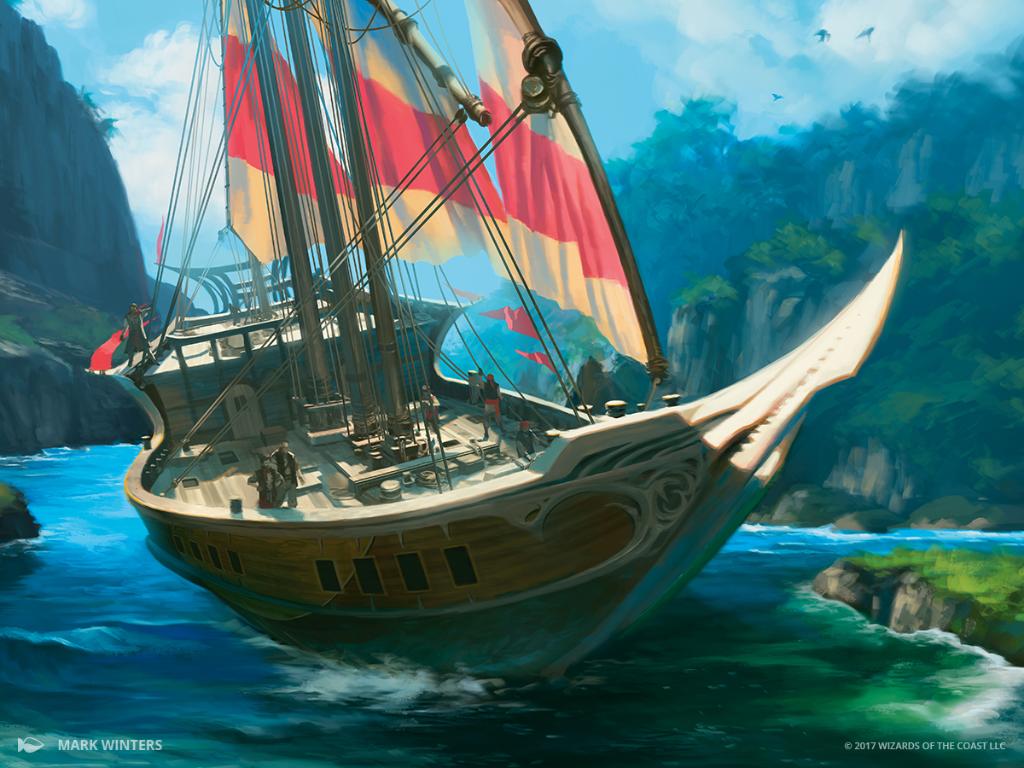

The Seafarer's Manual
Every adventurer, at some point, finds themself upon a harborside, gazing out at a vast expanse of ocean between themselves and their next destination. Perhaps the journey is dull, uneventful, or easy - or perhaps it's full of danger. Their ship might be chased by pirates, attacked by sea serpents, or wracked by mighty storms. Perhaps there's a sickness or mutiny among the crew, and the adventuring party need to don officers' colors. Or maybe your party's always dreamed of a pirate's life, with an ambition to claim a great ship and make it their own, a floating stronghold tacking from port to port.
Regardless of the cause, most campaigns take to sea at some point. The Seafarer's Manual aims to provide a complete ruleset for naval travel, ship combat, and navigating the waves. It also tries to be sleek and streamlined - the sort of document you can read in a few minutes and include in your game without headaches. It includes rules for ship-to-ship combat and boarding actions, as well as more pedestrian guidelines for how to handle long-distance sea travel and how to make your party useful aboard ship. Whether you need rules for a quick voyage lasting just one or two sessions, or want a long-term naval campaign with a home at sea, these rules should work for you. So come walk the quay, admire the ships, and if you're ready, dive right in - the water's fine!
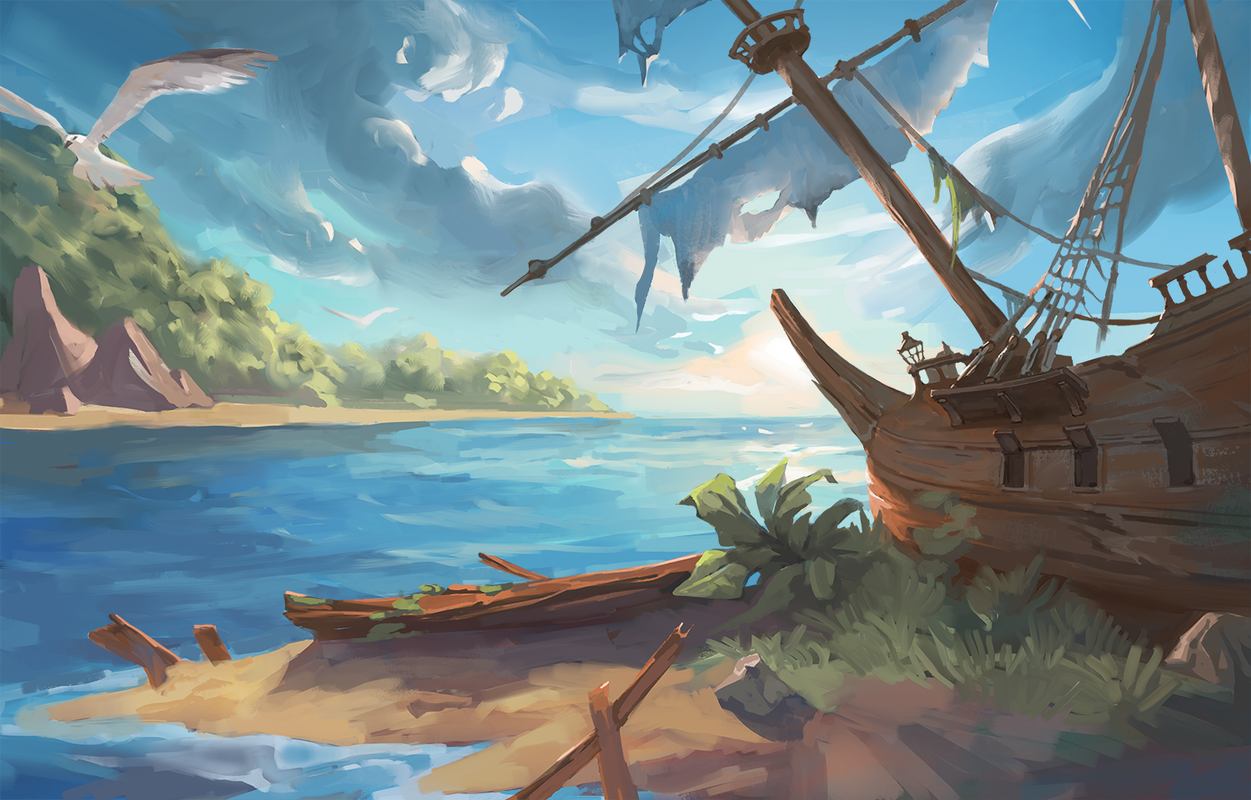

What to Expect
The Seafarer's Manual is divided into several sections, with some optional rules sprinkled in to help you adapt the rules to better suit your games.
Ships
Obviously, you can't sail without a ship. Ships get their own stat blocks, similar in many ways to creature stat blocks. Ships have several unique statistics, though, and have a few components, which can be damaged individually.
Voyages
The Seafarer's Manual doesn't recommend tracking individual travel days. Rather, it describes a system based on voyages - modeling the passage of time according to when interesting events happen. This scales up to handle weeks of travel across a trackless ocean, or scales down to handle a few hours of sailing in a treacherous strait. PCs making a voyage can take Travel Actions to help ensure a smooth sail.
Officers
And of course, every ship needs its officers. These will typically be PCs, but the DM can easily pad out a ship with NPC crewmembers if the party aren't able to cover all the essential roles. Every officer has their own menu of actions to take in combat or at sea.
Expansion Content
The base Seafarer's Manual provides you with a complete ruleset for ships and sailing, along with some sample ship statblocks - enough to let you run a few adventures at sea. Other resources that pair particularly well:
- Songs of the Spellbound Sea: The full version of this document will be included within Songs of the Spellbound Sea, a full-length print and PDF book. It includes an equipment index, additional officer positions, more ships, more equipment, and NPC statblocks. In addition, it's got three classes, dozens of subclasses, magic items, monsters, mini-settings, and more, to give you the best naval adventures you could ever ask for. Coming to Kickstarter June 11 2024!
- The Swashbuckler: A martial skirmisher class that fights with flair, Swashbucklers are perfectly suited for seafaring PCs, whether they be scurvy pirates or upstanding sailors.
- KibblesTasty Crafting: A good crafting system pairs very nicely with seafaring adventures, which tend to have multiple days of downtime in between scenes - and where sea monsters and uncharted islands are a great way to find interesting crafting ingredients.
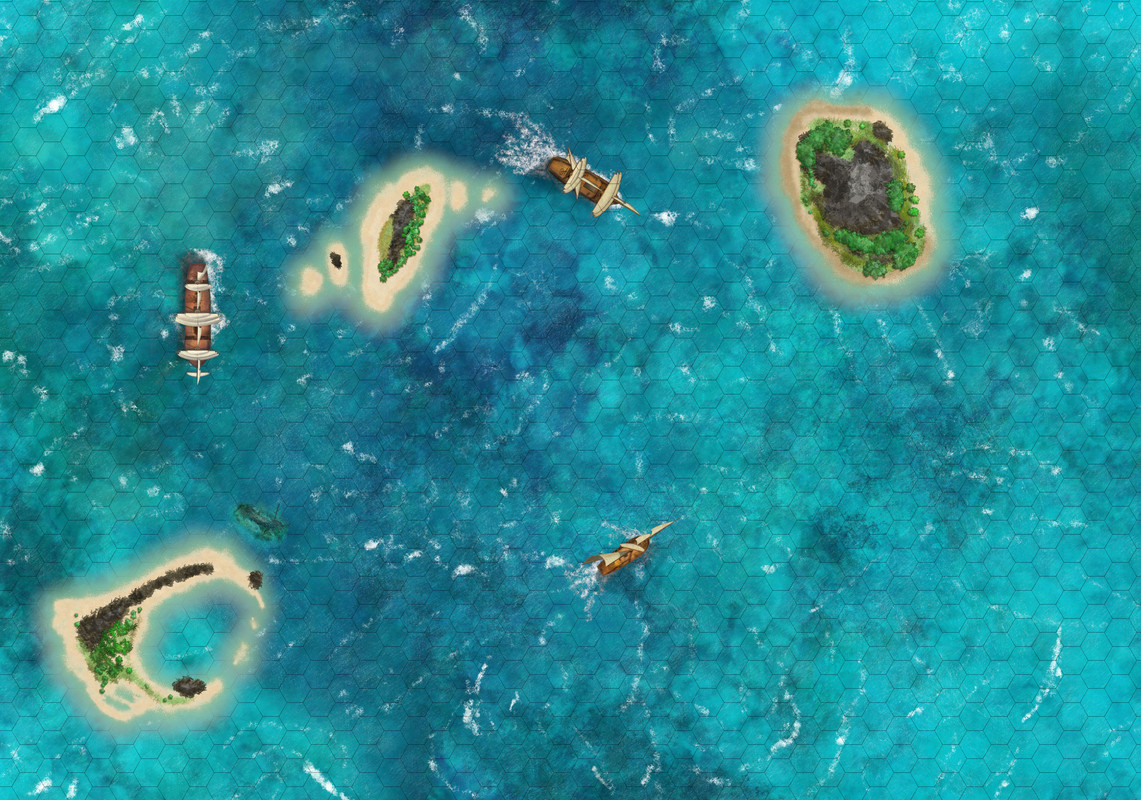


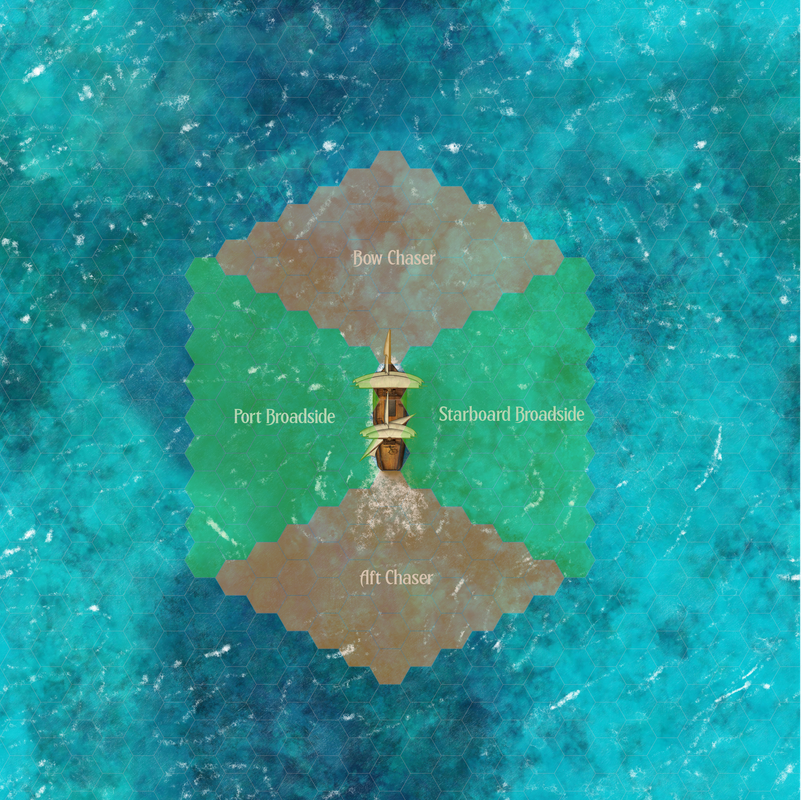


Managing Your Crew
A ship's stat block will indicate its crew requirements. For small ships, this may be 15-30 sailors, while for bigger ships, 50-80 is common. Massive galleons or men o'war may need well over 100 crew.
Skeleton Crew
Running a ship with the bare minimum crew is referred to as a skeleton crew - a ship with a skeleton crew moves at half speed, and can only make one attack when it takes the Attack action.
Officers in Brief
There are a eight available officer roles aboard ship. Four posts are senior officers - a ship suffers significant penalties if it sets sail without a senior officer. Four posts are optional officers. Most roles have applications both in and out of combat, though a few are strictly non-combat positions. Each officer has general duties, and gains specific actions they may take during combat and travel. A character can only serve in one officer position at a time.
The four senior officers are the Captain, Quartermaster, First Mate, and Bosun. The four optional officers are the Arcanist, Master Gunner, Navigator, and Surgeon. Each is described in detail later.
Morale
Morale represents the basic ability of the ship's crew - it's a function of raw skill, satisfaction, and leadership. It can range from -10 to +10. Most of the time when you take a ship action, you add your ship's morale to the role. Morale goes down when the ship suffers casualties, disease, poor leadership, or other calamities. Conversely, morale goes up when the crew are well-paid, healthy, and complete successful voyages. Your morale at the start of a ship's lifetime is a function of how skilled and disciplined a crew you hire.
- Slovenly crew: base morale of 3, with a maximum of 6.
- Standard crew: base morale of 4, with a maximum of 8.
- Skilled crew: base morale of 5, with a maximum of 10.
Mutiny
If the ship's morale is lower than 0, the Captain must make a mutiny check each day, which is a Charisma check (either Intimidation or Persuasion) modified by the ship's morale. If the result is between 1 and 9, then morale decreases by 1. If it's below 1, the crew mutinies, and may attempt to murder, imprison, or maroon the captain and their allies.
Variant Rule: Ship (Dis)Inspiration
Ordinarily, a ship's morale simply can't go below -10, or above its maximum. If you want to reward a very happy ship or punish a very miserable one, you can adopt this rule.
- When a ship's morale would go above its maximum, it gains inspiration. The captain can order this inspiration to be used to gain advantage on any d20 roll the ship or any of its crew makes.
- When a ship's morale would go below -10, it gains a point of misery. The DM can use this misery to force disadvantage on any d20 roll the ship or its crew makes.
Shore Leave
Shore leave allows the crew to relax and recuperate - if morale is below its base score, it resets to its base when you complete a voyage.
Variant Rule: Detailed Shore Leave
If you'd like a good justification to keep your PCs in port for a few days' worth of adventures, don't reset morale when you complete a voyage. Instead, it increases by 2 for every day spent in port, up to its base.
Reputation
Your crew may respond to the Captain's reputation - an esteemed (or nefarious!) captain may increase base and maximum morale by 1. Likewise, a particularly green captain may decrease base and maximum morale by 1.
Supplies & Wages
At standard rations, most ships will carry 30 days worth of supplies. You can stretch it to 45 days by going to reduced rations, which causes morale to drop -1 per week. You can also order double rations, which will only last 15 days, but will increase morale by +1 per week. A standard 30 days of rations doesn't count against a ship's cargo capacity.
For simple tracking of wages, use the average wage for each ship, as detailed in its stat block. Add 1gp per day for each NPC officer and senior rating, and 5gp per day for an NPC captain.
A skilled crew increases the ship's wages by 50%. A slovenly crew decreases them by 25% (and may be all you can hire, when you're just starting out).
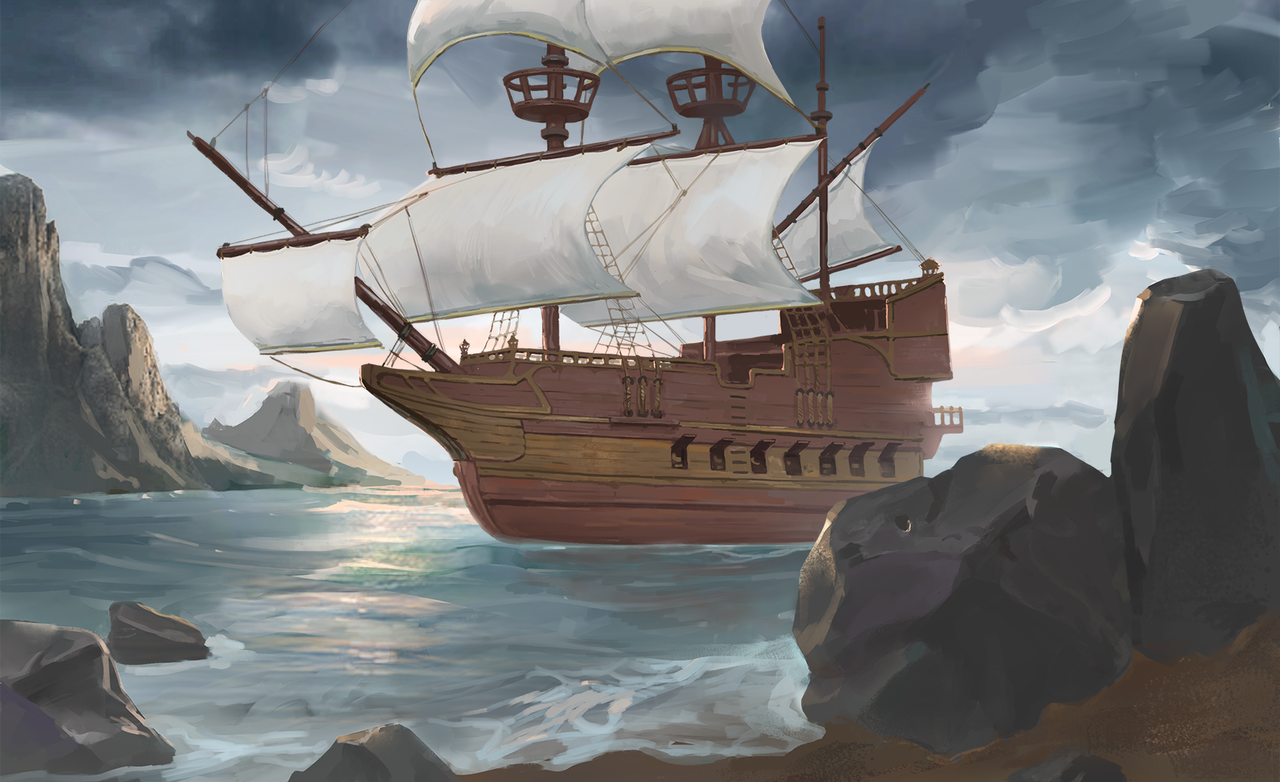

Voyages
Sailing travel is measured in voyages, and voyage legs. A voyage is any significant trip from one port to another. A voyage ends when the ship docks at a port of significant size and allows the crew to take at least one day of shore leave. When setting out from port, a captain must make an estimate as to the voyage length. The crew will have higher morale if they are expecting a short voyage.
- Short voyages are less than 1 week. Base morale increases by 1.
- Medium voyages are 1-2 weeks, and have no effect on morale.
- Long voyages are more than 2 weeks. Base morale decreases by 1.
If the estimate proves wrong, and the captain has to extend the voyage, morale decreases by 2 as your sailors grumble about the change of plans. Beyond a Long voyage, every additional 2-week extension causes morale to decrease by 2.
Voyage Legs
Voyages are composed of voyage legs, which are any significant stretches of travel in between major events. Legs are of variable length depending on the needs of the game; any time the ship spends between significant stops should count. Typically, each voyage leg will last a few days. For long voyages without many stops, you should treat each week as a separate voyage leg. After every voyage leg, morale drops by 1, as sailors get fatigued and miss port.
Planning a Voyage
For a quick guide on how to plan out a voyage, follow these steps.
- Obtain a ship.
- Hire a crew - slovenly, standard, or skilled.
- Appoint PCs to any officer positions they need.
- Hire senior ratings and NPC officers. Make sure every Senior Officer post is filled.
- Calculate the ship's wages,
- Have the Captain estimate the voyage length.
- Sail!
Officer Roles
Characters can occupy a variety of officer roles. Typically every PC will serve as an officer, with your party hiring NPCs to fill any senior officer positions nobody's qualified for.
Senior Officers
All ships suffer serious penalties if they are missing any senior officers.
Captain
The captain issues orders. The best captains have high Charisma scores, as well as proficiency with water vehicles and the Persuasion or Intimidation skills.
- Combat Actions: Inspire an Officer, Take the Helm, Rally the Crew
- Travel Actions: Raise Morale, Make 'Er Ship-Shape, Plot a Course
- No Captain? A ship cannot sail without a captain.
Quartermaster
The quartermaster is the second-highest ranking officer, responsible for logistics and discipline. They typically disburse pay or divide loot, resolve disputes at sea, and mete out discipline to unruly crew. They also are expected to lead boarding parties during combat. A commanding quartermaster is often the most well-rounded of the ship's officers, possessing high Charisma, and respectable Dexterity, Intelligence, and Wisdom, and the Persuasion or Intimidation skills.
- Combat Actions: Ready for Boarding, Rally the Crew, Emergency Repairs
- Travel Actions: Manage the Stores, Discipline the Ratings
- No Quartermaster? A ship without a quartermaster suffers double from any morale decreases.
First Mate
This specialist keeps the crew’s morale high by providing supervision, encouragement, and discipline. They also serve as the captain's right hand, though lower-ranking than the quartermaster. A first mate benefits from a high Strength or Wisdom score, as well as proficiency with Athletics and navigator's tools.
- Combat Actions: Take the Helm, Ready the Cannons, Treat the Wounded
- Travel Actions: Be the Backup, Plot a Course
- No First Mate? A ship without a first mate has disadvantage on all ability checks.
Bosun
The bosun serves as the foreman of the crew, and is responsible for duty assignments, ship repairs, and most maintenance. On a big ship, they'd likely delegate to a carpenter and a sailmaker; on a small ship, they're the go-to. A good bosun has high Dexterity, Wisdom, or Intelligence scores, as well as proficiency with carpenter's tools and the Survival skill.
- Combat Actions: Take the Helm, Emergency Repairs
- Travel Actions: Make 'Er Ship-Shape, Swab the Orlop!
- No Bosun? A ship without a bosun loses 10% of its maximum hp each day.
Optional Officers
A ship won't necessarily have a full complement of optional officers - if a ship doesn't have them, it doesn't gain any benefit from having them, but other officers or crew may cover their essential duties.
Arcanist
A ship's arcanist provides magical support for the crew and all the other officers. In battle, this may mean slinging fireballs or obscuring the ship with a fog cloud. Outside of battle, it could involve divination to check the ship's course or conjuring more favorable winds. An arcanist's performance is determined by their ability to cast spells, rather than any specific stat or proficiency. The presence of an Arcanist reduces the ship's base morale by 1 - sailors are superstitious and often uncomfortable relying on magic.
- Combat Actions: Magical Assistance, Magical Assault
- Travel Actions: Be the Backup, Find Fair Weather
Master Gunner
The master gunner supervises the cannoneers, both in combat and regular maintenance. They direct the gunnery crew in combat, and ensure the cannons are cleaned and secured outside of battle. A reliable master gunner tends to have a high Strength or Dexterity score, as well as proficiency with gunpowder weapons or smith's tools. A master gunner also enables the ship to fire specialty ammunition.
- Combat Actions: Ready the Cannons, Practiced Barrage
- Travel Actions: Pack the Powder, Come Up For Sunlight
Surgeon
The ship’s surgeon tends to injuries, keeps illnesses from spreading throughout the ship, and oversees sanitation. A capable surgeon benefits from a high Intelligence score, as well as proficiency with herbalism kits and the Medicine skill.
- Combat Actions: Tend the Crew, Treat the Wounded
- Travel Actions: Manage the Stores, Check for Scurvy
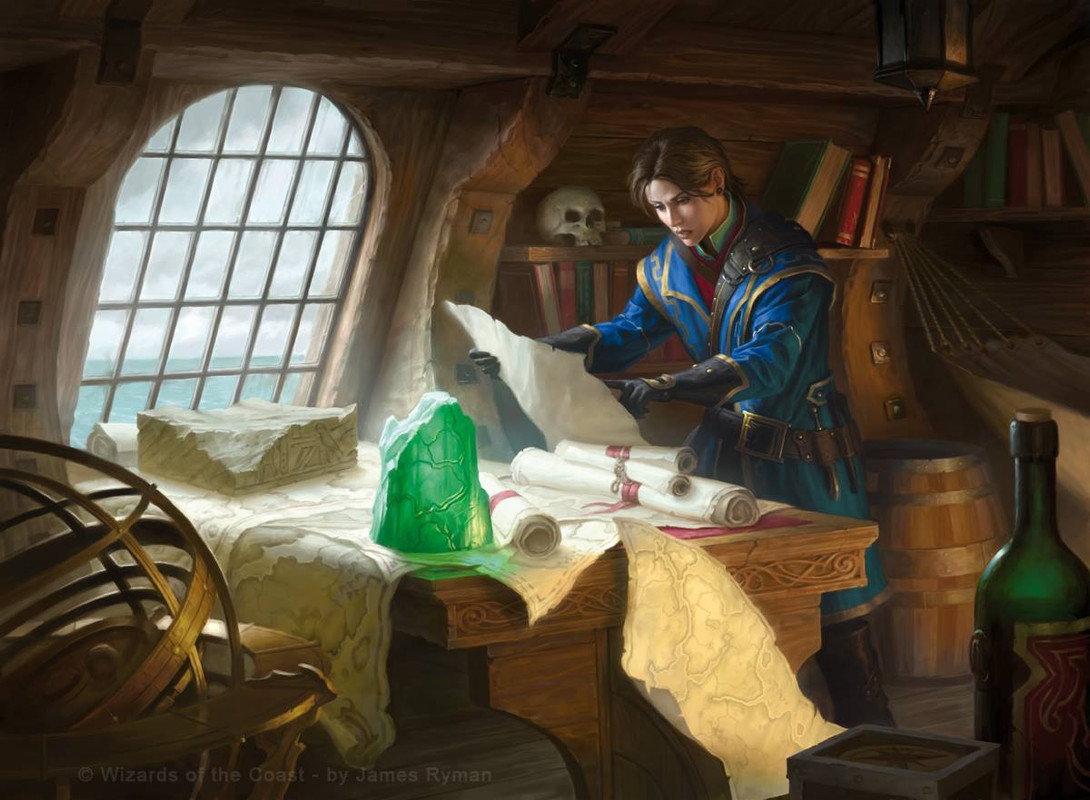

Senior Ratings
Senior ratings are specialized crew who are usually present on bigger ships, but may be absent on smaller vessels. They are not officers, but do perform specialized duties, granting passive bonuses to the ship.
- Cook: A ship’s cook works with the limited ingredients aboard ship to make meals. A skilled cook keeps the crew’s morale in top shape, while a poor one drags down the entire crew’s performance. A cook increases base morale by 1, and grants advantage on the Raise Morale action.
- Carpenter: A ship's carpenter works under the bosun, conducting repairs and keeping the ship seaworthy. A carpenter grants advantage to all checks made for Emergency Repairs or Make 'Er Ship-Shape.
- Sailmaker: A ship's sailmaker also works under the bosun, tending to the condition of the sails. A sailmaker increases the ship's combat speed by 10 feet.
- Musician: Some sailors are skilled with the viol or squeezebox, or are talented enough singers to entertain the crew. A musician increases base morale by 1.
Becoming An Officer
If the character's background gives them experience aboard ship, they automatically gain proficiency as an officer of their choice.
For other characters trying to become officers, make a DC 10 Intelligence check at the end of every voyage leg. If they make 3 successful total learning checks, they gain proficiency with water vehicles and become a qualified officer, meaning they can add their proficiency bonus to the skill checks involved in that role. Failures have no effect besides lengthening the time needed to learn a role. A natural 20 on a learning check counts as two successes.
A character who knows any ship role can learn another in the same way, though no character can be proficient in more than two roles at the same time. If they become proficient with a new role, they must lose proficiency in their choice of their existing roles.
Variant Rule: Quick Study
Want a faster pace? Skip the checks, and just let every PC select an officer role to learn at the completion of their first voyage.
Variant Rule: Proper Education
For a game more focused on realism, learning to crew a ship in just a week or two is a little tough to believe. For such a game, you can increase the required learning checks from 3 to 12. Since a voyage leg is often about a week, it will take at least two or three three months of sailing to gain proficiency.
Actions at Sea
Seafaring can be divided into two phases: travel, where each round lasts one leg of a voyage, and combat, where each round lasts one minute. In general, each officer aboard ship may take one action per round. Combat actions and Travel actions are distinct, and each officer will have multiple options. During travel, characters may also undertake any activity they reasonably could during a voyage (e.g. scribing spells, most crafting, learning languages). Every action can be taken only once each round.
DCs are described as Easy, Moderate, or Hard. Under normal circumstances, these correspond to DC 10, 15, and 20. But shipboard life has very few normal circumstances, and the DM may adjust the DCs as appropriate.
Officers always take their actions in rank order: Captain, Quartermaster, First Mate, Bosun, Arcanist, Master Gunner, Navigator, Surgeon. In combat, this happens immediately before the start of their ship's turn. During travel, every officer declares their action first, then takes their actions in the same order.
Combat Actions
Help Another Officer
Officers capable: All
You may use your Combat Action to provide advantage to another officer making a check.
Inspire an Officer
Officers capable: Captain
You may inspire any officer aboard ship in their duties. Designate an officer and make a Moderate Charisma (Persuasion or Intimidation) or Hard History (Intelligence) check - on a success, that officer receives a bonus equal to the modifier used on the next check they make this round. You may not inspire the same officer two rounds in a row.
Take the Helm
Officers capable: Captain, First Mate, Navigator
You may steer the ship, changing its course. On the ship's turn, it moves as you direct.
Rally the Crew
Officers capable: Captain, Quartermaster
You may inspire the crew, spurring them to great feats. Make an Easy Charisma (Persuasion or Intimidation check), adding the ship's Morale - on a success, the ship gains a +1 bonus to Morale until the end of the round.
Ready for Boarding
Officers capable: Quartermaster
You equip and rally the crew for hand-to-hand combat. Make a Easy Charisma (Persuasion) or Moderate Intelligence check, adding the ship's Morale - on a success, the party begins the boarding action with temporary hit points equal to the modifier used.
Ready the Cannons
Officers capable: First Mate, Master Gunner
You take charge of the cannons. On the ship's turn, it may attack, with you directing all its attacks.
Emergency Repairs
Officers capable: Bosun, Quartermaster
You assist some sailors making a quick patch to a damaged component of the ship. Make an Easy Dexterity (Carpenters' Tools) or Moderate Intelligence check, adding the ship's Morale. On a success, you roll a number of d4s equal to your proficiency modifier, adding the ship's Morale - the ship gains that many temporary hit points.
Trim the Sails
Officers capable: Navigator
You steer the ship closer to the wind, filling the sails with a favorable breeze. Make an Easy Dexterity (Water Vehicles) or Moderate Intelligence check, adding the ship's Morale. On a success, the ship's speed increases by 10 feet this round.
Practiced Barrage
Officers capable: Master Gunner
You help the gunnery crew prepare to fire. Make a Moderate Strength (Athletics) or Hard Intelligence check. On a success, the ship's Broadside deals 1 extra damage per gun.
Tend the Crew
Officers capable: Surgeon
You tend to injuries sustained by the crew. Make a Moderate Intelligence or Wisdom (Medicine) check. On a success, you heal a number of casualties equal to the ability modifier used.
Treat the Wounded
Officers capable: Surgeon, First Mate
This action may only be taken at the conclusion of a naval combat. Make an Intelligence or Wisdom (Medicine) check, with the DC equal to 5 + the total casualty count. A success by 5 or more means everyone recovers easily, and the ship loses no time. A success by 4 or less means everyone recovers, but the casualties need time to recover, and cannot serve as crew until completion of the current voyage leg. A failure results in the deaths of crew equal to the number by which you failed the check.
Magical Assistance
Officers capable: Arcanist
You assist any officer aboard ship via magical means. Designate an officer and expend one spell slot. Roll an Easy spellcasting ability check. On a success, the officer gains a bonus to their combat action check this round equal to the slot level.
Magical Assault
Officers capable: Arcanist
You cast a spell that directly interferes with the enemy ship. Expend one spell slot and roll a Hard spellcasting ability check. On a success, choose one of the following effects:
- The ship's speed is reduced by 5 feet per slot level until the end of its next turn.
- The ship suffers a penalty to morale equal to the slot level until the end of its next turn.
- The ship takes casualties equal to the slot level.
You cannot select the same effect two turns in a row.
Travel Actions
Make a Map
Officers capable: All
You attempt to map out any visible features and relate them to the ship's heading. Make a Moderate Intelligence (Navigator's Tools) or Hard Wisdom (Survival) check. On a success, any attempts to Plot a Course have advantage.
Fish
Officers capable: All
You drop a line and attempt to catch some fish as the ship sails, or while it is resting at night. Make a Moderate Wisdom (Survival) check. On a success, the ship consumes 1 day fewer supplies on this voyage leg.
Raise Morale
Officers capable: Captain
You may attempt to inspire the crew to greater performance. Make a Moderate Charisma (Persuasion) or Hard Intelligence check. If you succeed, morale improves by 1. If you fail by 5 or more, decrease morale by 1.
Make 'Er Ship-Shape
Officers capable: Captain, Bosun
You supervise needed repairs to the ship. Pick a component, and make a Moderate Dexterity (Carpenter's Tools) or Hard Dexterity (Water Vehicles). If you succeed, you restore the ship's health up to the next quarter-step (i.e., if it is below 25% hit points, it goes to 25%; if it is between 25-50% it goes to 50%, etc.).
Manage the Stores
Officers capable: Quartermaster, Surgeon
You ensure that the ship's stores are clean, well-preserved, and not being filched. Make an easy Wisdom (Water Vehicles) or Hard Intelligence check. If you succeed, improve Morale by 1.
Be the Backup
Officers capable: First Mate, Arcanist
You may help another officer with any Travel Action, granting them advantage on the check.
Discipline the Ratings
Officers capable: Quartermaster
You keep the crew in line. Make an Easy Charisma (Intimidation) or Moderate Wisdom check. If you succeed, improve Morale by 1. If you fail by 5 or more, decrease morale by 1.
Plot a Course
Officers capable: First Mate, Navigator, Captain
You chart a course to where the captain wants to sail. Make an Easy Intelligence (Navigators' Tools) or Hard Wisdom (Survival) check. If you succeed, the ship stays on course and makes good time, increasing travel pace by 50% for this voyage leg. If you fail by 5 or more, the ship's travel pace is reduced by 50% for this voyage leg.
Find Fair Weather
Officers capable: Navigator, Arcanist
You find favorable winds and currents to help with the voyage. Make an Easy Wisdom (Water Vehicles), Moderate Intelligence (Nature), or Hard Spellcasting Ability check. If you succeed, the weather cooperates and the ship's travel pace increases by 50% for this voyage leg. If you fail by 5 or more, the ship's travel pace is reduced by 50% for this voyage leg.
Pack the Powder
Officers capable: Master Gunner
You take extra care to prepare the cannons for combat. Make an Easy Strength (Athletics) or Intelligence check. If you succeed, the ship's next Broadside is made at advantage. If you fail by 5 or more, the it is made at disadvantage.
Come Up For Sunlight
Officers capable: Master Gunner
Tending the cannons isn’t quite a full-time job, so you’ve got free time on your hands to help the other officers. Designate an officer and make an Easy Intelligence check. If you succeed, that officer gains advantage on any checks they make as part of their Travel Action. If you fail by 5 or more, you inconvenience them so much that they suffer disadvantage.
Check for Scurvy
Officers capable: Surgeon
You inspect the crew and make sure they are disease-free and getting enough citrus. Make a Moderate Intelligence or Wisdom (Medicine) check, with advantage if you have proficiency with and access to an herbalism kit. If you succeed, improve Morale by 1.
Swab the Orlop!
Officers capable: Bosun
You reassign a troublemaking sailor to isolated and undesirable duty. Make a Moderate Intelligence check. If you succeed, you may prevent the next decrease to Morale that occurs on this voyage leg.
Appendix 1: Ships
This document includes two ship statblocks you can use. Ship statblocks are designed similarly to monster statblocks, using the same CR system. If you wish to design your own ships, it's recommended to make them a little higher on offense than defense, to keep battles faster.
Cog
A single-masted ship with one square-rigged sail, fore of the mast. They are slow and not very maneuverable, but are easy to crew, cheap to build, and cheap to operate. Often used as cargo freighters, they rarely have weaponry beyond small arms for the crew.
Cog
Gargantuan vehicle (sailing ship) (80 ft. by 30 ft.)
- Armor Class 14
- Hit Points 80
- Morale 3
- Speed 35 ft.
- Creature Capacity 20 crew, 20 passengers
- Cargo Capacity 100 tons
- Cost 4000gp
- Travel Pace 4 miles per hour (96 miles per day)
- Average Wages 20 gp per day
STR DEX CON 16 (+3) 6 (-2) 16 (+3)
- Damage Immunities poison, psychic
- Condition Immunities all but invisible, grappled, restrained
- Challenge 2
Weapons
Most cogs are unarmed, but they can give up half their cargo capacity to mount up to 8 9-pounder cannons, 4 per side.
Actions
Broadside, 4 9-pounders. Ranged Weapon Attack. +5 to hit, range 80/320, one target. Hit: 14 (4d6) bludgeoning damage.
Sloop
A slender single-masted ship with two or more triangular sails, fore and aft of the mast. Known for being quick and agile, sloops are a popular choice with pirates and smugglers.
Sloop
Gargantuan vehicle (60 ft. by 20 ft.)
- Armor Class 16
- Hit Points 120
- Morale 4
- Speed 50 ft.
- Creature Capacity 30 crew, 20 passengers
- Cargo Capacity 40 tons
- Cost 6000gp
- Travel Pace 6 miles per hour (144 miles per day)
- Speed 40 ft. sails
- Averages Wages 30gp per day
STR DEX CON 18 (+4) 8 (-1) 16 (+3)
- Damage Immunities poison, psychic
- Condition Immunities all but invisible, grappled, restrained
- Challenge 5
Weapons
Sloops can mount up to 12 12-pounder cannons, 6 per side. They can mount one chaser, either fore or aft.
Actions
Broadside, 6 12-pounders. Ranged Weapon Attack. +7 to hit, range 80/320, one target. Hit: 27 (6d8) bludgeoning damage.
Bow Chaser, 1 8-pounder. Ranged Weapon Attack. +7 to hit, range 80/320, one target. Hit: 3 (1d6) bludgeoning damage.
Brigantine
A double-masted ship with square-rigged sails. Brigantines are known for maneuverability, but not as nimble as sloops; they ride a little lower in the water, with deeper holds for more cargo. Popular with pirates and merchants sailing in dangerous waters.
Brigantine
Gargantuan vehicle (sailing ship) (50 ft. by 30 ft.)
- Armor Class 14
- Hit Points 80
- Morale 3
- Speed 35 ft.
- Creature Capacity 20 crew, 20 passengers
- Cargo Capacity 100 tons
- Cost 4000gp
- Travel Pace 4 miles per hour (96 miles per day)
- Average Wages 20 gp per day
STR DEX CON 16 (+3) 6 (-2) 16 (+3)
- Damage Immunities poison, psychic
- Condition Immunities all but invisible, grappled, restrained
- Challenge 2
Weapons
Most cogs are unarmed, but they can give up half their cargo capacity to mount up to 8 9-pounder cannons, 4 per side.
Actions
Broadside, 4 9-pounders. Ranged Weapon Attack. +5 to hit, range 80/320, one target. Hit: 14 (4d6) bludgeoning damage.
Sloop
A single-masted ship with two or more triangular sails, fore and aft of the mast. Known for being quick and agile, sloops are a popular choice with pirates and smugglers.
Sloop
Gargantuan vehicle (60 ft. by 20 ft.)
- Armor Class 16
- Hit Points 120
- Morale 4
- Speed 50 ft.
- Creature Capacity 30 crew, 20 passengers
- Cargo Capacity 40 tons
- Cost 6000gp
- Travel Pace 6 miles per hour (144 miles per day)
- Speed 40 ft. sails
- Averages Wages 30gp per day
STR DEX CON 18 (+4) 8 (-1) 16 (+3)
- Damage Immunities poison, psychic
- Condition Immunities all but invisible, grappled, restrained
- Challenge 5
Weapons
Sloops can mount up to 12 12-pounder cannons, 6 per side. They can mount one chaser, either fore or aft.
Actions
Broadside, 6 12-pounders. Ranged Weapon Attack. +7 to hit, range 80/320, one target. Hit: 27 (6d8) bludgeoning damage.
Bow Chaser, 1 8-pounder. Ranged Weapon Attack. +7 to hit, range 80/320, one target. Hit: 3 (1d6) bludgeoning damage.
Credits & References:
The Seafarer's Manual created by somanyrobots
Discord | Patreon
Art
- Sleek Schooner, by Mark Winters © Wizards of the Coast LLC
- Shipreck, by Olga Jaworska
- Naval Combat, by somanyrobots using assets by Limithron
- Sailing Ship, by Olga Jaworska
- Chart a Course, by James Ryman © Wizards of the Coast LLC
Assets
Map and Ship Assets by Luke Stratton | Limithron
Background Image Stains
Fan Content Policy
This work is unofficial Fan Content permitted under the Fan Content Policy. Not approved/endorsed by Wizards. Portions of the materials used are property of Wizards of the Coast. ©Wizards of the Coast LLC.
Thank you supporters!
A heartfelt thank you to my patrons, whose generous support helps make this work possible. And a special thank you to:
- Alwin Meijboom
- arawnannwn
- Bel
- bluewarbler
- David Sharp
- GlaciesGlace
- Makasem
- Maya
- Sm0ll33B1ggz
Changelog
v0.2
- Reduced voyage lengths
v0.1.1
- A few quick reorganizations and a clarification on calculating ship attacks
v0.1
- Roughest Draft
Planned Changes
This is just the very first release on this ruleset. I'm going to iterate on the core rules as they receive more playtesting and more feedback. Things that are already in the works, which you can expect to see:
- Wind and weather rules!
- More ships!
- Sea-beasts!
- Ship and cannon upgrades!
- Ammunition types!
- Detailed boarding actions (with ramming rules!
- More guns! Swivels, mortars, carronades, and more!
- Quick-reference officer role cards!
- An appendix on the sorts of historical considerations this document makes, and how it tries to adapt historical context while producing a fun TTRPG.
- Nautical terminology glossary
- Crashing
- For DMs: A list of shipboard crises and events.
- Notes on combat for ships vs. non-ships
- Possibly a casualties rework
- Replacing casualties with either morale effects or a "crew points" system
- Demoting the surgeon from an officer to a senior rating
